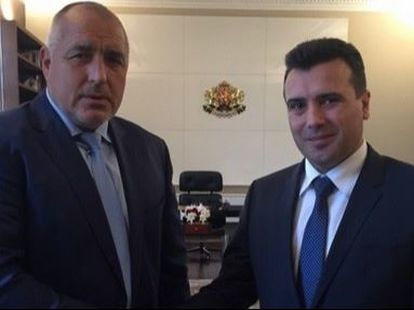 Prime Ministers Boiko Borisov of Bulgaria and Zoran Zaev
Prime Ministers Boiko Borisov of Bulgaria and Zoran Zaevof the Former Yugoslav Republic of Macedonia (FYROM)
Photo credit: Ministry of Foreign Affairs of Bulgaria
The signing represents the culmination of years of diplomatic efforts by a succession of governments in Sofia and Skopje to get the wording of the treaty signed and agreed.
The treaty is based on the text of a 1999 declaration between Bulgaria and the FYROM.
The moves to get the document finalised and signed was agreed on in June 2017 during a visit to Bulgaria’s capital Sofia by Zaev, soon after he became the FYROM's head of government.
Among other provisions, the treaty provides for the setting up of a committee to examine events in the shared histories of the two countries, and for Bulgaria and the FYROM to hold joint celebrations of personalities and events in history.
The document affirms that the two countries have no territorial claims on each other.
Bulgaria and the FYROM undertake effective measures in their respective countries against unscrupulous propaganda.
For the document to come into force, it must be ratified by the parliaments in Sofia and Skopje. Recently, Bulgaria’s National Assembly unanimously approved a declaration backing the declaration. However, in Skopje, the opposition led by former [ultra-nationalist] prime minister Nikola Gruevski has been highly critical of the treaty.
During Borisov’s visit to Skopje, Bulgaria and the FYROM also were to sign memoranda of co-operation in the areas of natural gas and transport.
Even though Bulgaria was the first to recognise the former Yugoslav republic as the "Republic of Macedonia" after that country’s departure from the former Yugoslavia, relations between the two countries frequently have been vexed, with disputes among politicians and in the media about key issues regarding national identity, language, history and other sensitive matters.
Speaking after the August 1 2017 signing ceremony, Zaev said that the signing of the friendship treaty showed that where there was political will, issues would be solved.
Bulgaria and the FYROM had taken a historic step forward together, he said.
Zaev said that the treaty was an example of co-operation in the region. “We see a constructive partner in the Bulgarian government,” he said.
Borisov noted that the signing of the treaty had eluded the two countries for several years, and thanked Zaev and his team for the months of work to achieve the signing.
He predicted a positive reaction from the European Union to the signing of the treaty. The results of the treaty would be visible to citizens both of Bulgaria and of the FYROM, Borisov said.
The Bulgarian Prime Minister noted that he and Zaev were from two different political families in Europe, respectively the conservative European People’s Party and the Party of European Socialists. His message was that this had not stood in the way of achieving agreement.
Source: The Sofia Globe




 RSS Feed
RSS Feed